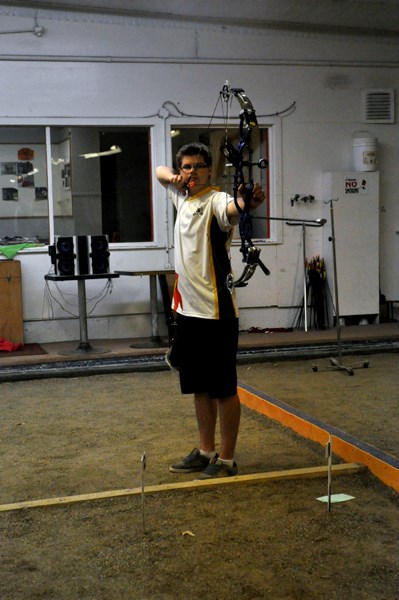For six years, Tyson Mackrell has been competing in archery, and four times he's competed nationally.
Earlier this month, the 18-year-old member of the Battle River Archers club shot his way to winning the national championship for junior men's compound archery in Woodstock, N.B. It was just around two weeks after winning the provincial title.
"It was surreal, I guess. It didn't really hit me right away. After my last round I was fourth going into the last day and it was rainy and cold, sucked, really sucky day," he said. "I had the round of my life and I was so happy, because my dad was flying in, he wasn't there yet, he was flying in and he landed in Toronto and I called him, I was like, 'No matter what I place, I don't care because I shot so well. I'm already just really happy. It doesn't matter where I place anymore.' Then, ended up winning by, I think it was 10 points, over second."
Mackrell competed in three types of archery between Aug. 4 to 10 - field archery, FITA and 3D. His championship came in 3D, which is where archers walk through a course and come across fake animals with scoring rings. Archers then judge the distance, which Mackrell describes as one of the most important parts of the sport, then shoot the animals. FITA, which he placed fifth in, is target shooting. Each archer has 144 arrows. They shoot 36 arrows at 30 metres, 50 metres, 70 metres and 90 metres each. Mackrell placed sixth in field archery, which is a mix of the two. Archers walk through the bush, similar to 3D, but they shoot at targets which are at a known distance.
Even though he practices every day, he wasn't expecting to take home the national title.
Mackrell started archery because concussions forced him out of hockey.
"I needed a sport to do and I always wanted to archery hunt, so I got a bow and came to the club, then seen that a kid got a trophy. My first day of being there the coach brought a trophy back from competition and I was like, 'Oh I want to do that!' And then ever since I've been competing competitively," he said.
Mackrell hunts with both a rifle and bow, but he said his shot isn't nearly as good when it comes to rifle hunting. Not surprisingly, though, he's had success bow hunting. When he was 13, he says he bagged the second largest antelope ever shot with a bow, only one year after he started in archery.
Although his passion began as a result of an interest in hunting, it's the human interaction he cares about the most now.
"It is a sport where you can go and spend the day talking to people, meeting new people, all the time. No matter who you are, you can just go to any competition and just talk, and have fun," he said. "That's one thing that's awesome about archery is, everybody's really friendly, always wants to talk. It's lots of fun."
There must be something in the water at the Battle River Archers club, because the provincial competition in July in Regina had locals all over the leader board. Tyson's father, Larry, finished sixth in the bow hunter open competition. Tyson's sister, Kirstie, came second in the female bow hunter open. First place in that event was another member of the club, Raquel Hepp. Spencer Hepp finished first in male cub archery. Lalia Cann finished second in female cub. Tawnie Kotyk won the female cadet compound competition. In the male master 50 archery competition, the top two spots went to Brian Hawkins and Ross MacAngus. MacAngus was also named the archery coach of the year in Saskatchewan.
Mackrell might not get to train as much as he has been come the fall as he heads to the University of Saskatchewan. He does, however, hope to be able to come back to Battleford on the weekends and avoid getting rusty.
"One thing about archery, it takes a lot of practice. Because of muscle memory and stuff because when you get in the big competitions, you just go back to what you know and if you don't practice lots then you'll struggle," he said.

